What Is SEO And Why Does It Matter?
Do you want to drive more traffic to your website, and convert more prospects into customers? Of course, you do! Who wouldn’t want that?
And if that’s the case, you’ll love today’s post where we talk more about SEO, and why it matters to all businesses, big or small.
In a few paragraphs, we cover a lot of crucial areas so that you can design the perfect SEO strategy without breaking a sweat.
This is a beginner’s guide, so we will avoid complex jargon that makes SEO seem complicated whereas it’s as simple as A, B, C.
That said, let us dive right in.
So, what is SEO?
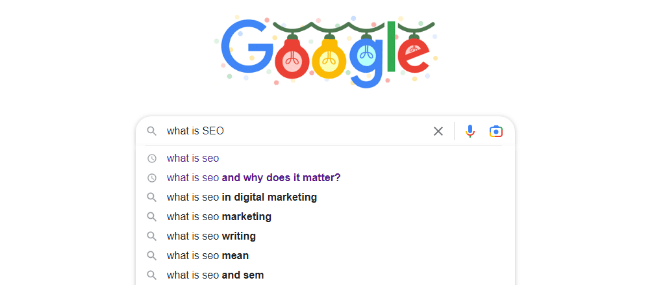
First things first, what is this beast we’re calling SEO? The mere mention of SEO scares the living daylights out of many small business owners, especially absolute beginners.
Throw in other terms such as search engine algorithms, KPIs, and SERPs and you will have them running for the hills faster than you can finish a latte.
However, SEO is not as challenging as many “gurus” make it out to be.
It’s relatively easy stuff, and anybody – even if it’s your first time hearing about SEO – can do it without hiring an agency or consultant, which by the way is a concern for small businesses with tight budgets.
For starters, SEO stands for search engine optimization. And it’s the multifaceted process of making your website more visible in Google, Bing, Yahoo, Baidu, and many other search engines.
And it’s a marketing channel not to be ignored. According to these statistics, more than 50% of all trackable website traffic comes from search engines.
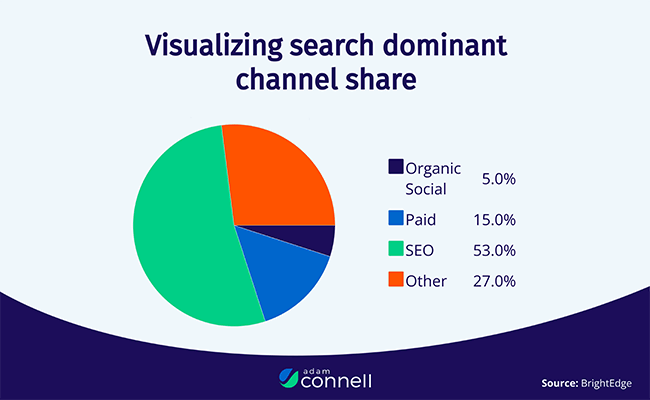
SEO tactics help small businesses rank higher (or well) in search results. For most marketers, that means positions #1 to #5 on the first page of Google.
As a business, you should also strive for these coveted top positions as you prepare your SEO strategy.
Why is that important?
Because, according to an article by our very own Matt Moran, a whopping 67.6% of all clicks go to the first five organic search results.
Also, 90% of searchers don’t go past the first page. You don’t want to rank on page 10 when you can apply the tips and tools we share to claim your deserved position on page one for relevant keywords.
In a nutshell, search engine optimization is all about enhancing your web pages to rank higher in search engines. It is as simple as that.
SEO involves a couple of tried-and-tested techniques that are easy and free to implement. I know this first hand because I have ranked websites and articles severally without spending a dime.
However, keep in mind that SEO takes longer to deliver results compared to other direct forms of digital marketing such as pay-per-click (PPC) adverts.
It will take months to realize results but if you do your homework well, SEO delivers solid results in the long run without the high costs that come with other marketing strategies.
Additionally, it’s important to note that SEO is a two-pronged approach: on-page and off-page SEO.
On-page and off-page SEO
To drive organic search traffic to your site, you need a successful SEO strategy that involves two main approaches. Both are ridiculously easy to implement; you’ll laugh at yourself for not starting sooner.
Firstly, we have on-page SEO, which involves all the SEO efforts you apply directly to your website to rank in search engine results pages (SERPs). See? No complex jargon 🙂
This includes creating content that matches the user’s search intent, adding relevant keywords, fixing broken links, ensuring your site is fast and mobile-friendly, and eliminating code that hinders search engines from discovering your website, among other things.
But, don’t worry. This is easier than you might think. Especially with the help of on-page SEO tools.
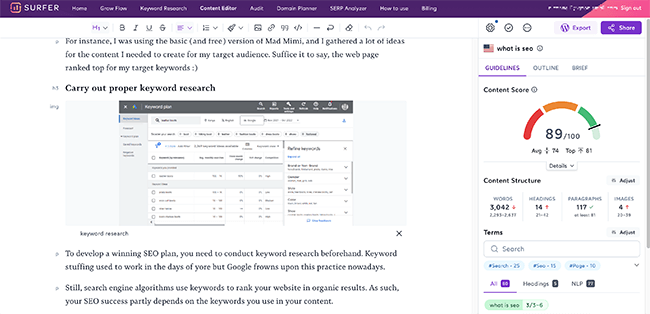
Off-page, on the other hand, refers to all SEO efforts that you do on third-party websites. This includes link building, social media sharing, guest blogging, directory submissions, blog commenting, and much more.
At the same time, you must play by the rules to enjoy higher Google rankings, and drive more organic traffic to your website.
It’s precisely why you will hear experts talking about black hat and white hat SEO.
White hat vs black hat Search engine optimization
If you want to rank in search engine results pages, you must abide by the rules or the likes of Google won’t hesitate to penalize you and leave you out to dry.
White hat SEO involves using legitimate techniques to rank your web pages. It involves following rules, such as what is outlined in, say, this Search Engine Optimization (SEO) Starter Guide, or Bing Webmaster Guidelines.
White hat SEO techniques include:
- Creating a mobile-friendly and responsive website
- Claim your listing on Google Business
- Improving user experience on your web pages
- Doing proper keyword research beforehand
- Have a well-rounded content management plan
- Pay attention to link building, and only link to authoritative pages in your niche
- Create content for human readers as opposed to search engines
- Improving your site architecture
- And many more – See more Google ranking factors here.
Also, don’t sweat the details, there are many SEO tools to help you out if you are stuck. SE Ranking and Semrush are popular options.
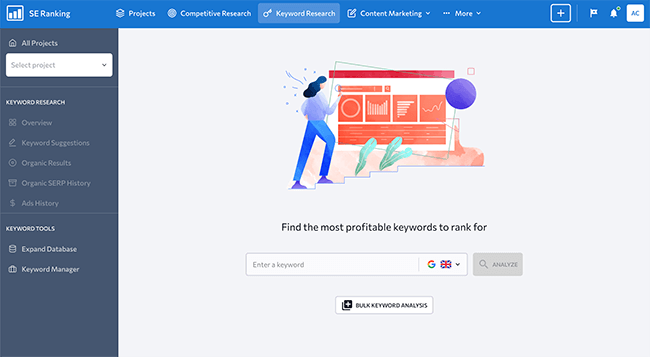
On the other hand, black hat SEO involves using shady techniques to trick search engines for higher rankings. Usually, this lands you in hot soup as Google and others update their search algorithms.
Black hat SEO tricks include:
- Buying links
- Offering free products for links
- Adding footer links with commercial anchor text. Google will penalize you aptly.
- Adding hidden links
- Comment spam
- Overused anchor text
- Adding malicious backlinks
- PBNs (websites that link to each other for the sole purpose of tricking search engines)
- Keyword stuffing
- Adding hidden content
- Article spinning
- Plagiarized or duplicate content
- Using doorway pages that redirect users to other pages
As you can see, there are many black hat SEO strategies you can use to game the system. But don’t do it, my friend.
You will cause more harm than good. Search engines will ban and de-index your website, which leads to lost rankings, and a poor brand image down the line.
After all, Google offers you a long list of more than 200 ranking factors (and the things to avoid) The linked article by Brian Dean offers you proven white hat SEO techniques that work like magic.
That out of the way, why is SEO important?
Why SEO is important
If SEO (and search engine marketing in general) is all new to you, you might be wondering why SEO is important, to begin with. You might be asking yourself why you should invest in SEO. Here are some reasons why your small business needs SEO.
Visibility & better rankings
Search engines work like answer machines, offering searchers the answer they need when they need it most.
You can leverage the power of SEO to increase visibility, which helps searchers to find your website when they search for your products or services.
The more effective your SEO strategy, the higher the chances that your content will rank and prospects will find your website.
This is especially great for brand awareness, especially if you just created a new website.
Note: You can track rankings in a very basic way using Google Search Console. This is good because it’s free and the data is accurate. But it’s extremely limited. This is why we use dedicated rank tracking software so we can see daily ranking fluctuations and react accordingly.
Search engine optimization increases web traffic to your site
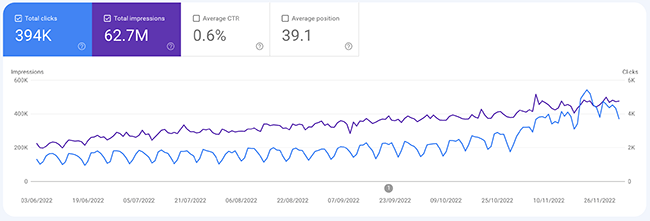
If you are anything like the rest of us, you want more traffic from organic search results. The #1 position in Google gets 32% of all clicks, which is pretty awesome.
Additionally, organic search traffic leads to higher click-through rates (CTR) and more conversions compared to other methods.
Why?
Because most people usually take to search engines when they are actively looking for information or a specific product.
They are more likely to trust your website if you appear in position #1 as opposed to, say, position #30.
By the way, most people won’t see your URL if you’re on the third page of Google because, as we said earlier, 90% of searchers don’t go past the first search engine results page.
If you want more organic traffic to your website, it’s time to spruce up your SEO strategy and get down to work. Aim for the first five positions, and ideally spring for number one.
Remember that only 2.8% of US searchers click on paid ads. In contrast, 20x more searchers click on organic search results. You can see where the potential to generate more website traffic lies.
SEO builds authority
When I started doing SEO for one of my websites, I was just another writer/web designer on the web. I would have shown you the website but I pulled it down due to other commitments.
Things, however, changed when I started ranking number one for some of my main keywords. I started getting emails from prospects who believed I was an expert in my field.
And they weren’t wrong because most of these prospects later became paying customers that have hired my services for years.
See, SEO involves a common practice known as link building – earning external links from reputable and high-traffic websites.
This sends a signal to search engines that your website is trustworthy and relevant to the searcher’s query.
What happens?
Search engines reward you with better rankings, which leads to more organic traffic, and a positive brand image.
In other words, SEO helps you to establish yourself as an authority in your field. After all, you’re more likely to trust a website that appears number one in organic search results. Right?
A quick note about domain authority metrics:
Some SEO tools will help you calculate ‘authority’ of a domain based on the quality and quantity of the backlinks pointing at it.
For example, Moz has DA, Ahrefs has DR, and SE Ranking has DT. These are all third-party metrics usually based on a scale of 1-100.
But if you have high DA, for example, that doesn’t mean your website will rank and get traffic. Google doesn’t use any of these metrics in their ranking algorithms.
This is why we recommend that you avoid making any important decisions based on these metrics. Also, avoid attempting to increase these metrics.
They’ll naturally increase as you develop your SEO strategy.
Great SEO leads to a better user experience (UX)
SEO involves creating high-quality content and other website changes such as eliminating broken links and improving your page load speeds.
Improving the speed of your web pages, for instance, means users will spend more time on your website and reduce your bounce rates.
Also, making your website mobile-friendly and responsive will make it more usable and boost your conversion rates.
If you had no idea, these engagement metrics (click-throughs, bounce rates, time spent on your site, etc.) have a direct correlation with your search engine rankings.
Improving your SEO means improving user experience, which is a win-win for you and your users.
For instance, slow web pages which trigger high bounce rates will lead to lower SEO scores and conversion rates.
A poor UX will annoy your web visitors and cause your website to disappear from organic search results, costing you lots of money and time down the line.
So, how does a small business with zero experience and a limited budget create a formidable SEO profile that dominates web searches?
Top 3 SEO best tips and practices
So you want to dive into the world of SEO marketing but are unsure? Perhaps you’re wondering if SEO work is difficult or maybe a tad expensive. Or maybe you feel like you need more SEO education before taking the plunge.
Perhaps you don’t know the right keywords to use on your landing pages for SEO success. Maybe you’ve heard a thing or two about local SEO strategies but don’t know what to do or where to start.
Don’t fret, we have just the SEO tips you need to own organic results like a boss and soar high like an eagle.
Even if you’ve never heard of ranking factors or how search engines work, the following tips will help you rank any web page or blog post easily.
1. Define your target audience
Paid search results can help you reach your target audience quickly, but organic search traffic will bear fruits for many years to come without the high costs of advertisements.
But do you know your target audience, and what they are actively searching for? Will the content you create resonate with your target market or will you be shooting out of the blue expecting something to stick?
After all, you’re not creating website content for a search engine. You want to provide content that fulfills the searcher’s intent.
Nowadays, search engines understand user intent, and will only show relevant results depending on the searcher’s query.
Will your website show up in the search results when your target audience comes looking for what you have to offer?
It’s important to understand your target audience clearly. Understand their browsing behaviors, spending patterns, the keywords they use to find your website, geographical location, language, and everything else in between.
Matching search intent is a surefire way of boosting your SEO rankings and – most importantly – offering your target audience exactly the content they need when they need it.
User intent can be broken into three main categories:
- Informational – e.g., when a user searches for “how to bake bread at home.”
- Navigational – when a user looks for a specific brand e.g., “Microsoft” or “Apple.”
- Transactional – when a user is ready or looking to make a purchase e.g., “best Microsoft Surface deals black Friday.”
When you understand your target audience, you can craft content that ranks highly in a search engine depending on the user intent.
In other words, understanding your audience means you have concrete data to meet them at their point of need.
On top of that, defining your target market means you will know exactly where to channel your marketing dollars for the best results. Ask around – it’s way better and more successful than trying to market to the entire world.
If you don’t know where to start, your Google Analytics report is a good place to learn more about your target audience and important metrics about your website traffic.
You can also use social media, surveys, and focus groups to learn more about your audience. I once added a simple survey form on my website, and I was pleasantly surprised.
Your web visitors are ready to tell you more about their needs. You just have to ask. You can create a survey using Google Forms, for example. It’s free.
We’ve had great results from sending surveys in email newsletters.
For instance, I gathered a lot of ideas for the content I needed to create for my target audience. Suffice to say, the web pages ranked top for my target keywords 🙂
If you haven’t started building an email list, you’ll need one of these email marketing tools to get started.
MailerLite is a good option thanks to their free plan. You get all the features you’ll need and up to 1,000 subscribers. Beyond that, you’d need to upgrade but it’s one of the more affordable tools on the market.
Then, add some opt-in forms to your site, and promote your email newsletter via social media to get some subscribers in.
Also, I’d also recommend creating an automation sequence and including a specific email in your sequence that can share your survey with new subscribers automatically. This will allow you to learn more about your audience and get a constant flow of ideas for blog posts & other types of content.
2. Carry out proper keyword research
To develop a winning SEO plan, you need to conduct keyword research beforehand. Keyword stuffing used to work in the days of yore but Google frowns upon this practice nowadays.
Still, search engine algorithms use keywords to rank your website in organic results. As such, your SEO success partly depends on the keywords you use in your content.
For best results, try to find the keywords that website visitors use to find your website and content.
A keyword research tool such as Google Ads Keyword Planner can help you generate keyword ideas, determine the competitiveness of your terms, and come up with keyword alternatives to use in your content. It’s primarily designed for ads but it’s useful for organic search as well.
Google Analytics and other website analytics tools can also help you determine the keywords web visitors use to find your content, and how these people behave once they’re on your website.
There are plenty more tools you could use. We’ve covered these before so I encourage you to check out our post on keyword research software, if you’d like to learn more.
Don’t forget long-tail keywords in the process. For example, you have a better chance of ranking high for a term such as “leather boots for women” compared to “leather boots.”
Web crawlers use these keywords (and the usefulness of your content, among other ranking factors) to determine if your website is the right match for a user’s query.
Add a few keywords to your content but don’t overdo it. Remember, stuffing keywords in your content doesn’t work anymore. And it’s best to forget about keyword density completely.
3. Focus on content
As far as SEO goes, content is undoubtedly still the king. That is unique, relevant, and valuable content that solves your visitor’s problem.
As we said earlier, Google determines ranking depending on the relevancy of your content. After all, the search giant and the likes are answer machines that want to provide searchers with the most rewarding experience.
If you create poor-quality content just to fill your keyword quota, you won’t get very far. Google can easily tell when your website has low-quality content that isn’t helpful to users.
To avoid this trap, aim to create content for your human readers instead of focusing on page rank.
When people find your content useful (and probably share it with others), search engines will soon follow, and reward you with higher rankings.
Google, for instance, is rapidly developing artificial intelligence to distinguish between sites that provide real value and sites that provide the illusion of value.
Search engine optimization tools
For beginners, SEO might be daunting at first. Luckily for you, there are many SEO tools on the world wide web to help you rank your website easily.
If you use a content management system such as WordPress, you have amazing SEO plugins at your disposal. Some fantastic examples include:
Are you looking for an SEO audit to determine where you stand? The following tools will come in handy.
Creating SEO-friendly content is no easy task for just about anyone. If that explains your sitch, feel free to check out the tools below.
Keywords are an important part of any SEO campaign. To find out the keywords people are using to find your website, check out these tools.
Want to see how your content is ranking in organic search? The following tools offer you just what you need.
Link building is a vital part of SEO. Earning links from other websites shows Google and other engines that your website is trustworthy and relevant. The following tools can help you build a solid link-building profile.
The above tools make up a small sample of SEO tools available today. Check out the linked articles to discover more useful tools. Some tools offer features that cover most categories. As is the case with the likes of Semrush and SE Ranking.
Conclusion
SEO is a big industry. We can’t possibly cover everything in a single guide. However, we hope today’s article points you in the right direction as far as SEO goes.
If you liked the post, please share it on social media. Feel free to ask your questions on social media as well.
Disclosure: If you buy through links on our site, we may make a commission. This helps to support the running of Startup Bonsai.
